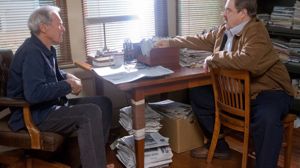Perhaps Clint Eastwood is a more powerful figure than we realize. He got himself onstage on the final night of last month's Republican National Convention, arguably the make-or-break moment of Mitt Romney's political career. He did it without, apparently, a script--or really much of a plan for what was going to come out of his mouth. That kind of influence extends far beyond the sortof Hollywood clout that allows him, at a whim, to green-light a movie.
But this isn't a letter about Clint. It's about the corruptive nature of absolute power. The kind of power that was passed down to you by The Artist Formerly Known as Josey Wales, power that you, Geoffrey, wielded so eagerly as you were putting together the cast for the baseball drama Trouble With The Curve. With this power, you were able to draft, from a pool of Hollywood heavy-hitters, a team of actors that reads like a roster of Hollywood's most dependable supporting players: John Goodman, Robert Patrick--I'll even throw Matthew Lillard in there, who seems somehow more substantial than he was when he slurred his way through the first Scream film. And who wouldn't want these guys onscreen, if only to lend a bit of credibility to the proceedings?
However, in filling out the rest of the cast, you did precisely what one might expect. If you asked me who might perfectly play the aging baseball scouts who hang out with Clint Eastwood in the rickety first-base bleachers of a small North Carolina town, I likely would have picked from the ether of memory the police captain from True Romance, and, let's say, oh, the police captain from Basic Instinct. And, sure enough, there they are onscreen: Ed Lauter and Chelcie Ross, two of the most familiar That-Guy!s in Hollywood. If you'd asked me to choose a pair of dispassionate white male corporate executives who fold their hands and sigh and transmit information via squinty sidelong glances from opposite ends of a boardroom table, my brain would probably conjure the faces of the evil warden from_ Shawshank Redemption and, oh, I don't know, Assistant District Attorney Irwin Bernstein from _Hill Street Blues. Sure enough: Bob Gunton and George Wyner show up too.
These guys are all pros. They've been playing roles like this for decades. Half a century, some of them! But, Geoff, is populating the frame with the most familiar faces supposed to be your job? In Trouble, you've made the most obvious casting choices. The same way screenwriter Randy Brown has transcribed the most recognizable dialogue in service of the most worn-out plot (aging baseball scout comes to terms with changing game, ambitious careerwoman must choose between family and a promotion, failed minor-league player deals with disappointment). The same way, too, the musical score hits the most conspicuous emotional beats, and the straightforward cinematography captures everything necessary and nothing more.
The movie is, itself, obvious. All the choices you've made are the right choices. Nothing wrong, at all, with the faces and voices you've chosen to populate this fictional world--except that they're so obviously fictional. We are aware, throughout every frame of film, that we are watching a movie. And for a picture that clearly aspires to evoke some very real emotions, this sort of perfunctory obviousness produces, instead, emotional passivity.
In the end, it's just a movie. Actors reading lines. In front of cameras. Overwhelmingly functional. A thick sheen of competence. Inaccessible. By the numbers, to a fault.
And that's the sort of freedom that absolute power gives you: to make choices without risk, which are, invariably, the most boring choices to make.
Sincerely,

Jared







